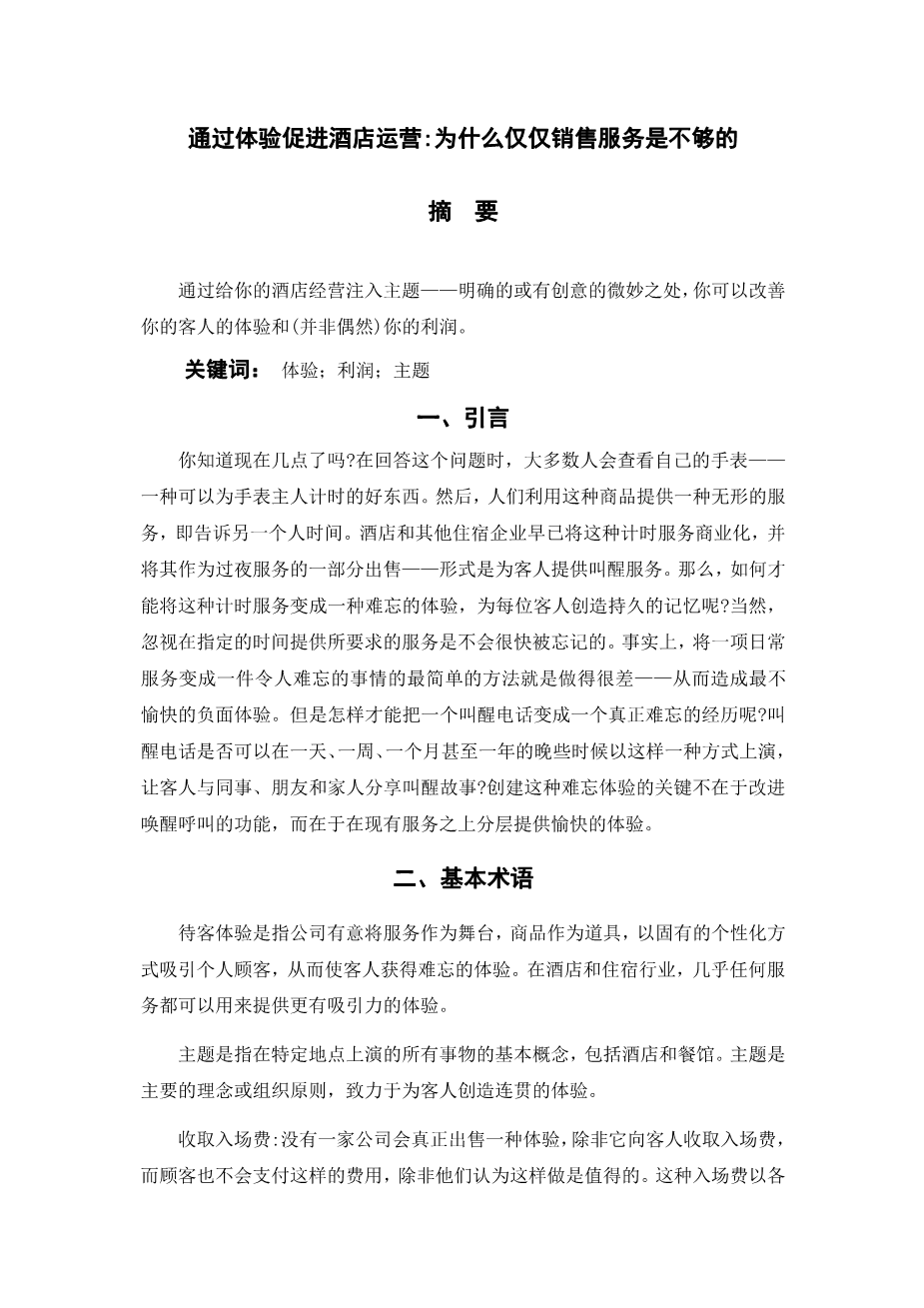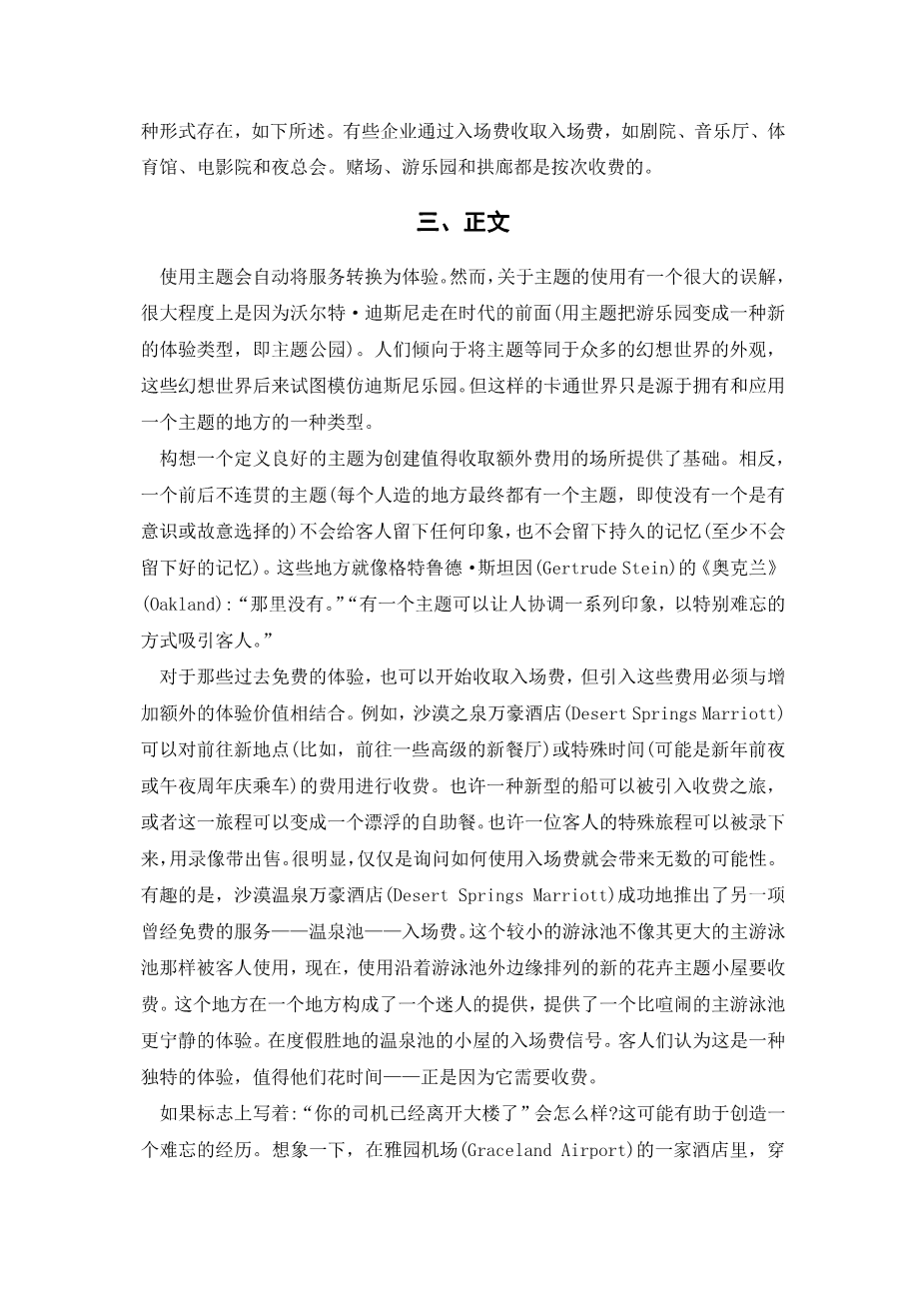Differentiating hospitality operations via experiences: why selling services is not enough
Abstract
By infusing your hospitality operation with a theme-explicitly stated or creatively subtle you can improve your guestsrsquo; experience and (not incidentally) your profits.
Keywords: Experience ;Profits ; The theme
I. INTRODUCTION
Do you know what time it is? In answering that question, most people check their wristwatch-a tangible good that performs a timekeeping function for its owner. People then use that good to provide the intangible service of telling another person the time. Hotels and other lodging businesses have long ago commercialized this timekeeping service as part of the overnight stays they sell-in the form of wake-up calls for guests。How, then, does one turn this timekeeping service into a memorable experience clone that creates a lasting memory for each guest? Certainly, neglecting to provide the requested service at the specified time will not be soon forgotten. Indeed, the easiest way to turn a routine service into a memorable event is to perform it poorly-thus creating a negative experience of the most unpleasant kind. But how does one turn a wake-up call into a positively memorable experience? Could wake-up calls be staged in such a way that guests share wakeup stories with colleagues, friends, and family members later in the day, week, month, or even year? The key to creating such memorable encounters lies not in improving the functionality of the wake-up call, but in layering an enjoyable experience atop the existing service.
II. BASIC TERMINOLOGY
Hospitality Experiences is guests obtain a memorable experience when a company intentionally uses services as the stage and goods as props to engage individual customers in an inherently personal way. In the hospitality and lodging industry, almost any service can be leveraged to stage a more compelling experience.
A theme is the dominant idea or organizing principle, devotion to which creates a coherent experience for guests.
Charging Admission: No company truly sells an experience unless it charges its guests an admission fee, and customers wonrsquo;t pay such a fee unless they deem it worthwhile to do so. Such admission fees exist in a myriad of forms, as outlined below. Some businesses charge admission via entry fees, such as theatres, concert halls, sports arenas, movie cinema, and nightclubs. Casinos, amusement parks, and arcades charge per-play fees.
III.MAIN BODY
Using a theme automatically turns a service into an experience. A great misconception surrounds the use of themes, however, largely because Walt Disney was so far ahead of his time (in using themes to turn amusement parks into a new genre of experience, namely, theme parks). People tend to equate themes with the facades of numerous fantasy worlds that have since sought to emulate Disneyland. But such cartoon worlds are only one genre of place that stems from having and applying a theme.
Envisioning a well-defined theme provides the foundation for creating places worthy of commanding added fees. In contrast, an incoherent theme (and every man-made place ends up with a theme, even if none was consciously or intentionally selectedrsquo; ) gives guests nothing around which to organize impressions, and yields no lasting memory (or at least not a good one). Such places are like Gertrude Steinrsquo;s Oakland: “There is no there.” Having a theme allows one to harmonize a set of impressions that engage guests in a particularly memorable way.
Itrsquo;s possible to initiate admission fees for those experiences that have been free in the past, but introducing such charges has to be done in conjunction with adding additional experiential value. The Desert Springs Marriott could, for instance, charge for a ride to new places (to some exclusive new dining venue, say), or at special times (perhaps on New Yearrsquo;s Eve or for midnight anniversary rides). Perhaps a new type of boat could be introduced for the for-fee trips, or perhaps the ride could turn into a floating buffet. Maybe a guestrsquo;s special voyage could be recorded and sold on videotape. Clearly, just asking how an admission fee could be applied opens up myriad possibilities. Interestingly, the Desert Springs Marriott successfully introduced an admission fee for another service that was once free, its Springs Pool. Not used by guests as much as was its larger main pool, this smaller swimming spot now charges an access fee to use the new flower-theme cabanas that line the poolrsquo;s outer edges. This place-within a-place constitutes a charming offering that presents a more tranquil experience than that of the noisier main pool. The admission fee for the cabanas at the Springs Pool at the resort signals
guests that itrsquo;s an exclusive experience thatrsquo;s worth their time-precisely because it commands a fee.
What if the sign were instead to read, say, “Your driver has left the buildingrsquo;? Now that might help create a memorable experience. Imagine shuttle-bus drivers for a Graceland Airport Hotel sporting big sideburns and wearing large, white bellbottoms, singing “Love Me Tender” as guests step on and off. One need not resort to fictitious hotel venues, of course, to see how the concept might work; perhaps a Memphis Marriott or Tupelo Sheraton could take the idea and drive with it. Using a theme in this manner provides a direct means for hotels to upgrade their offerings from ordinary services (e.g., wake-up calls, shuttle-bus rides) to extraordinary experiences. To do otherwise risks a hotelrsquo;s becoming further commoditized and undifferentiated in customersrsquo; minds. The question, then, isnrsquo;t whether to embrace new experience-staging techniques, but rather what techniques to use and where to employ them for maximum effect. We fully expect that inno
剩余内容已隐藏,支付完成后下载完整资料


英语译文共 3 页,剩余内容已隐藏,支付完成后下载完整资料
资料编号:[410172],资料为PDF文档或Word文档,PDF文档可免费转换为Word
您可能感兴趣的文章
- COVID-19时期的旅游业和可持续发展:以西班牙为例外文翻译资料
- 农民相对剥夺感对乡村旅游可持续发展的影响机制外文翻译资料
- 校园大学生的旅行行为——以亚洲某乡村大学为例外文翻译资料
- 内容旅游与地方社区响应:鹫宫的“幸运之星”和“协作动漫旅游”外文翻译资料
- 基于符号互动理论的遗产旅游资源开发与重塑——以良渚古城遗址为例外文翻译资料
- 在TikTok上映射互联网名人:探索注意力、经济和可见性劳动力外文翻译资料
- 基于社区游客视角的环境责任行为的概念和度量外文翻译资料
- 温泉小镇的再造:维希的独特案例——副标题外文翻译资料
- 基于IP理念的桐乡丰子恺文化旅游开发研究外文翻译资料
- 特殊事件对旅游业的影响及其应对措施研究——新冠肺炎疫情对全球旅游业的影响及其应对措施外文翻译资料


